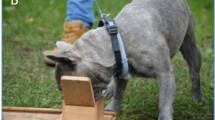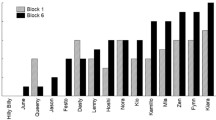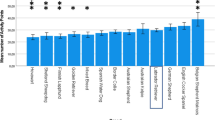Abstract
Previous studies have shown that most food-deprived genetically nervous pointer dogs fail to learn a bar-pressing response for food reward and those which do learn are erratic in bar pressing compared to genetically normal pointer dogs which usually learn rapidly and perform well. Benzodiazepine drugs facilitate learning and performance of the responses in nervous dogs. The present study aimed at finding whether a stronger drive producing state, such as water deprivation, would facilitate learning and performance in even severely nervous dogs. Eight normal line and 7 nervous line dogs successfully learned to perform well a paddle-pressing response which activates a valve releasing water into a drinking pan. One disturbed dog of each line did not learn successfully. Behavior shaping was about as easy and as rapid in nervous line dogs as in normals. Nervous line dogs tended to be as consistent in responding. However, response rates of nervous line dogs averaged about two-thirds those of normal line dogs, the slowed rate of responses being taken up mostly in excessive, rather stereotyped, licking of the water pan. Response rates correlated well with degree of nervousness as measured on independent well standardized behavior tests. This behavior seems to add another dimension to the characterization of the nervousness of these “spooky” pointer dogs.
Similar content being viewed by others
References
Angel, C., Murphree, O. D., and DeLuca, D. C.: The effects of chlordiazepoxide, amphetamine and cocaine on bar-press behavior in normal and genetically nervous dogs.Dis. Nerv. Syst.,35:220–223, 1974.
Dykman, R. A., Murphree, O. D., and Peters, J. E.: Like begets like: Behavioral tests, classical autonomic and motor conditioning, and operant conditioning in two strains of pointer dogs.Ann. N. Y. Acad. Sci.,159:976–1007, 1969.
McBryde, W. C. and Murphree, O. D.: The rehabilitation of genetically nervous dogs.Pav. J. Biol. Sci.,9:76–84, 1974.
Murphree, O. D., Peters, J. E., and Dykman, R. A.: Effect of person on nervous, stable and crossbred pointer dogs.Cond. Reflex,2:273–276, 1967.
Murphree, O. D., Peters, J. E., and Dykman, R. A.: Behavioral comparisons of nervous, stable and crossbred pointers at 2, 3, 6, 9, and 12 months.Cond. Reflex,4:20–23, 1969.
Murphree, O. D. and Newton, J. E. O.: Schizokinesis: Fragmentation of performance in two strains of pointer dogs.Cond. Reflex,6:91–100, 1971.
Murphree, O. D.: Inheritance of human aversion and inactivity in two strains of the pointer dog.Biol. Psychiat.,7:23–29, 1973.
Murphree, O. D., Angel, C., and DeLuca, D. C.: Limits of therapeutic change: Specificity of behavior modification in genetically nervous dogs.Biol. Psychiat.,9:99–101, 1974.
Murphree, O. D., Angel, C., DeLuca, D. C., Newton, J. E. O., and Farris, H. E.: Nervous dogs: A partial model for psychiatric research.Lab Animal,3:16–19, 1974.
Newton, J. E. O. and Murphree, O. D.: Sporadic transient atrioventricular block and slow heart rate in nervous pointer dogs. A genetic study.Cond. Reflex,5:75–89, 1970.
Newton, J. E. O., Chapin, J. L., and Murphree, O. D.: Correlations of normality and nervousness with cardiovascular functions in pointer dogs.Pav. J. Biol. Sci.,11:105–120, 1976.
Author information
Authors and Affiliations
Rights and permissions
About this article
Cite this article
Newton, J.E.O., Chapin, J.L. Operant performance patterns of normal and nervous water-deprived dogs. Pav. J. Biol. Sci. 13, 22–28 (1978). https://doi.org/10.1007/BF03005153
Issue Date:
DOI: https://doi.org/10.1007/BF03005153




